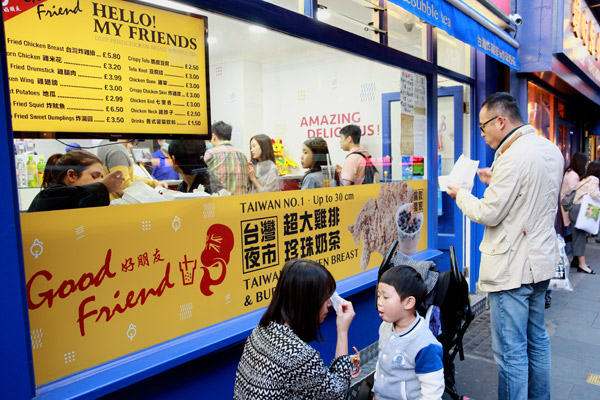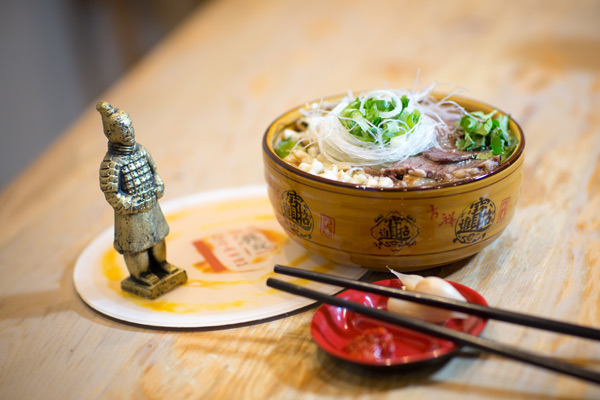UK's foodies savoring flavors from the street
 |
|
Bigbe Chicken, a Taiwan-style fried chicken shop in London's Chinatown, offers a serving of sizzling chicken at less than 6 pounds. [Photo by Dai Tian/China Daily] |
Coming out as a foodie can be intimidating in the UK, a country that is notorious for trivializing eating. However, thanks in part to buzzing Chinese street food stalls, more and more people are opening up about their love of good food.
Shanghai steamed dumplings, face-sized deep-fried chicken breasts, Shaanxi burgers, and jianbing guozi or Chinese savory breakfast crepes, are among the slew of new eating experiences hitting the UK's streets.
Cheap and readily available, the street food now being served up in Britain retains its word-famous high standards and adds new choices for people in a nation that is ready for more "authentic" Chinese flavors.
"Our popcorn chicken is crunchier than KFC's," claims Jesse Wong, a proud assistant at Bigbe Chicken.
Situated in London's Chinatown, the Taiwan-style fried chicken shop offers meaty and juicy bites at less than 6 pounds a serving.
"Garlic-flavored fried chicken is the most popular choice among Britons, just as it is in Taiwan," she said.
Roger Jen, the boss of Bigbe Chicken, opened his store in April.
"Fried chicken is a very popular Taiwan snack. I had been planning to open this shop for more than five years," he said.
He said non-Chinese customers already make up about 50 percent of his customer base.
For those who convulse at the idea of eating fried food, momordica grosvenori, a traditional Chinese herb, is added to the dish to soothe sore throats and relieve inner heat.
 |
|
Shaanxi-themed food stall Murger Han serves pita bread in lamb soup, in London. [Photo provided to chinadaily.com.cn] |
Other Chinese food sellers are also noticing that British people are eager to get their teeth into new flavors.
"Times have changed and Britons are more ready to move forward and try new things," said Li Bin, who runs Murger Han, a Shaanxi-themed food stall that offers liangpi (cold noodles) and roujiamo (Chinese hamburgers).
Though little known in Europe, roujiamo are believed to have first been prepared in China some 2,400 years ago.
To prepare the dish, streaky pork must be stewed for hours in a soup containing about 20 different spices and seasonings that include cinnamon, anise and cardamom, before being minced into fine shreds and stuffed in a mo, a piece of flatbread baked yellow until it is crisp on the outside and soft inside.
Li, 28, says the tradition behind the dish is more important than anything else.
"We won't adapt for those who can't accept it. All ingredients are imported from China to preserve the original flavor," he said.
After starting the business two years ago, Li said it was initially something that soothed his homesickness and the longing for home among his friends from Shaanxi.
According to Mintel, a global market researcher, food inspired by the dishes from the most populous country in the world have been Britain's favorites, both at home and in ethnic restaurants, for the past two years.
Research found that 80 percent of people who use restaurants or takeaways have visited a Chinese eatery, followed by 71 percent who have visited Indian outlets and 40 percent who have eaten Mexican food.
Veteran celebrity TV chef Ken Hom says attitudes toward Chinese food have changed enormously.
"Chinese food at the beginning of the 80s was sweet and sour pork, mainly," he said.
"Most Brits had a very stereotypical view of Chinese food. Now, you are seeing more regional Chinese food, and it is no longer just Cantonese food."
The first Chinese food arrived in the UK in the early 19th century. It was strongly influenced by Cantonese cuisine and Cantonese dim sum-small bite-sized portions of food served in steamer baskets that has long been prized by many British diners.
But, in recent years, several regional cuisines have mushroomed in the UK, including those from Sichuan and Zhejiang. Other styles that can now be found include food from Dongbei, Fujian, Henan and Shaanxi.
Richard Ford, senior food analyst at Mintel, said authenticity has been one of the key factors for Chinese cuisine's ability to endure in the UK market.
Li Bin, the street food seller, agrees.
"It may take some time to expand customers' scale, but I would never add lettuce to my roujiamo just because some diners prefer it," he said.
As Li sees it, he is showing respect to Chinese traditions by making authentic dishes in London.
Contact the writers at [email protected]




















